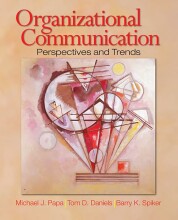Organisation Theory: Prescriptions for control
11 important questions on Organisation Theory: Prescriptions for control
What are the main ideas of Scientific Management?
- one best way to perform any job
- personnel should be selected on basis of their skills or potential
- workers should be compensated on an incentive plan that pays them in direct proportion to the work that they produce
- labour should be divided so that managers plan the work and workers follow the plan
What are the 14 principles of Fayol?
- division of work
- authority and responsbility
- discipline
- unity of commnad
- unity of direction
- subordination of individual interests
- remuneration
- centralisation
- scalar chain: structure as hierarchy with clear lines of command, but allow departure of this structure too
- order
- equity
- stability in tenure
- initiative
- esprit de corps: management should promote a sense of unity, harmony and cohesion
What are the six features of weber's bureaucratic theory?
- a clear hierarchical system of authority
- divison of labour according to specialisation
- a complete system of rules regarding the rights, responsibilities and duties of personnel
- exhaustive procedures for work performance
- impersonality in human organisational relationships
- selection and promotion of personnel solely on the basis of technical competence
Intention to eliminate ambiguity and capriciousness, increase decision making and improve efficiency in task performance and equal treatment of employees
- Higher grades + faster learning
- Never study anything twice
- 100% sure, 100% understanding
What does the traditional theory of Follet's Administration entail?
- Principal of reciprocal response: human interaction always involves mutual and simultaneous influence
- goal of integration: harmonious marriage of differences that produces a new form, a new entity, a new result made out of the old differences and yet different from any of them
- focus on building and sustaining democracy throguh integration of different, compettign interests
What does the traditional theory of Barnard executive functions entail?
- underestimation variability of individual behaviour and impact on the org.
- organisational effectiveness depends on the individual's willingness to cooperate
- communication = an indispensable concept
What does the Human Relation Movement state?
- hawthorne: similar conditions are influenced by the employees attitudes against them
- mayo: managers should be friendly in their relationships with workers, listen to worker concerns and give workers a sense of participation in decisions in order to meet their social needs
- importance of social needs rather than economic needs and urges managers to adopt communication strategies that give workers a sense of participation
What are the four main premises of HRD?
- work is meaningful
- workers are motivated by meaningful, mutually set goals and participation
- workers should be increasingly self-directed, which will imrpove efficiency and work satisfaction
- managers are most effective when coaching, working to develop untapped potential and creating an environment where potential can be fully utilised
What is the maslow pyramid of needs?
- psychological needs for food, oxygen, and other basic requirements to sustain life
- safety needs for security, protection and freedom from threat
- social needs for love, affection, affiliation and acceptance
- esteem needs for a sense of status, recognition and self-respect
- self-actualisation needs to realise one's full potential as a human being
What does theory x of Mcgregor ential?
- employees dislike work
- managers must rely on threat and coercion to gain employee compliance
- mistrust, highly restrictive supervision and a punitive atmosphere
What does likert's four system theory as most effective communication?
- communication between superiors and subordinates is open and extensive. superiors solicit ideas and opinions, and subordinates feel free to discuss problems with superiors
- decision-making is decentralised and made through group processes
- information flows freely through flexible channels of communication and in all directions
- performance goals are developed through participative management
- control processes are also decentralised
What characteristics are connected to effectiveness?
- flexible networks with open channels of communication and mutlidirectional message flow
- availability of accurate, adequate information
- mutual trust, openness and supportiveness
- participation and cohesiveness in group decision making, problem solving and other task-related processes under team-oriented leadership
The question on the page originate from the summary of the following study material:
- A unique study and practice tool
- Never study anything twice again
- Get the grades you hope for
- 100% sure, 100% understanding































